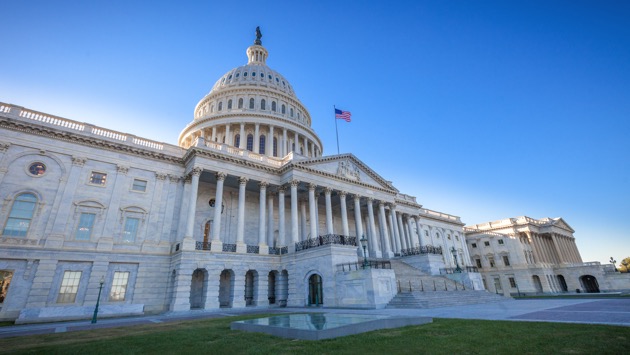(WASHINGTON) — After 87 days of negotiations, the $1 trillion bipartisan infrastructure bill was passed in the House Nov. 5 with the help of 13 Republicans — a decision that swiftly set conservative GOP members on the attack against their colleagues.
Many Republicans took to social media to bash their GOP colleagues who delivered key votes that got part of Biden’s “Build Back Better” agenda across the finish line. But while the backlash has been fierce, at the moment the vote does not seem likely to cause extensive political fallout in the midterm elections.
Rep. Fred Upton, R-Mich., who voted for the infrastructure bill, told The Detroit News he has received over 1,000 phone calls, including death threats, since then.
He said most calls are not from constituents in his district but from across the country, likely triggered by Rep. Majorie Taylor Greene, R-Ga., tweeting out the phone numbers of 12 of the 13 Republicans who voted for the bill.
The calls have “very disturbing, adult language, to say the least, that truly is frightening,” Upton said Tuesday in an interview with CNN. Upton’s office did not respond to a request for comment.
But as for the midterms, only 10 of those 13 House Republicans who broke rank are running for reelection next year. Reps. Anthony Gonzalez, Adam Kinzinger and Tom Reed have already announced they won’t be seeking another term in 2022.
Three Republicans — Reps. Don Bacon, Andrew Garbarino and Jeff Van Drew — currently don’t have challengers for the GOP nomination in their districts, according to Federal Election Commission filings.
For Reps. Brian Fitzpatrick and Nicole Malliotakis, their challengers’ campaigns are virtually nonexistent aside from their filings for candidacy: They haven’t reported any money and don’t have campaign websites. One of Rep. John Katko’s challengers has no funding or presence of a campaign and the other, John Murtari, has reported about $2,000 in funds to the FEC.
That currently leaves only Upton and Reps. David McKinley, Chris Smith and Don Young with underdog challengers who could use the infrastructure vote in their favor to scoop the Republican nomination.
Aseem Prakash, a political science professor at the University of Washington, said he doesn’t think the political fallout for these Republicans is going to be significant.
“It’s very hard to say that we should not repair our roads,” he said. “These are things that people can see. They are not controversial. Having worldclass infrastructure is not left or right, it’s American.”
Thomas Kahn, a distinguished faculty fellow at the Center for Congressional and Presidential Studies at American University, said voting for the infrastructure bill was a smart move for a general election but not necessarily for Republicans in their primaries.
“The problem is the Republican primary,” he said. “The message of the challenger will be every vote is — and by the way, this is the message of the majority of House Republicans — that a vote for this bill is a vote for Joe Biden.”
The silence from Republican House leadership is also important to note, both Kahn and Prakash said. House Minority Leader Kevin McCarthy, R-Calif., has neither come out in support of the Republicans who voted for the bill nor against them.
Kahn said comments like the one made by Sen. Lisa Murkowski’s, R-Alaska, who called the concerns over giving Biden a win “petty,” could help her colleagues politically.
“The more Republicans who come out and support them the better it will be for them,” Kahn said.
They might not need much help, though. Even those Republican challengers who got a boost from their oppenent’s infrastructure vote didn’t see a windfall.
Upton’s main primary challenger is Steve Carra, who was endorsed by former President Donald Trump in September. While Carra has the backing of one of the GOP’s most prominent figures, he said his campaign only saw a small boost in donations after Upton voted for the bill.
Upton, however, may still face additional challenges in the midterm race because he was one of 10 House Republicans who voted to impeach Trump after the Jan. 6 Capitol riot.
As for the race for West Virginia’s 1st District, McKinley has two challengers: Carly Braun and Michael Sisco. Both campaigns are still getting off the ground in terms of funding, and McKinley’s vote for the infrastructure bill didn’t change that.
Braun, who was against voting for the bill, did not see a significant increase in donations, her campaign told ABC News. Sisco’s campaign could not be reached for comment.
The campaign that got the largest boost from an opponent’s vote for the infrastructure bill was that of Michael Blasi, who is challenging Smith in the race for New Jersey’s 4th District. His campaign saw social media engagement quadruple over the last week and is expecting to have the equivalent of 40% of Smith’s funding by the end of next quarter.
Alaska’s Don Young, who is Congress’ longest serving member and is in his 25th term, has a few challengers, and the most threatening one has a family with a long political history in the state. Nick Begich is a member of one of Alaska’s leading Democratic families, though he is running on the Republican ticket.
Begich’s grandfather was elected to Alaska’s only House seat in 1970 and shortly thereafter went missing when his plane disappeared. Young replaced him in 1972 and has held the position ever since. Begich’s father was a Democratic senator, elected in 2008.
Begich’s campaign is still in its infancy, but he may become a substantial challenger down the road due to his family’s significance in the state.
With the midterms less than a year away, it appears that challengers to incumbents who voted for infrastructure have not garnered the resources or momentum to win the GOP nomination — at least not yet. But there is still time for the infrastructure vote to become a decisive factor, Kahn said.
Copyright © 2021, ABC Audio. All rights reserved.


